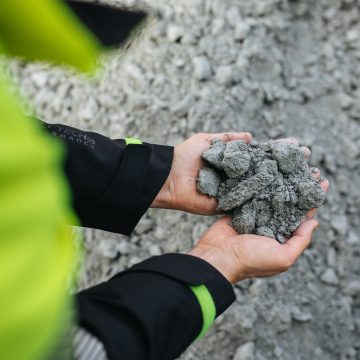The European Parliament has given the green light to new measures to prevent and reduce waste from food and textiles across the EU. For context, each European generates 132kg of food waste and 12kg of clothing and footwear waste per year. The updated legislation will introduce binding food waste reduction targets, to be met at national level by 31 December 2030: 10% from food processing and manufacturing and 30% per capita from retail, restaurants, food services and households.
Author: admin
UK introduces landmark legislation to protect ocean
The UK government has introduced a landmark bill to protect two-thirds of the world’s ocean, a key source of food and oxygen for people in the UK and all over the world. This marks a major step forward in global efforts to protect marine life and ecosystems beyond national borders.
Heatwaves linked to carbon emissions from specific energy companies
A study published in Nature shows that around one-quarter of the heatwaves recorded in the period 2000–23 can be directly linked to greenhouse-gas (GHG) emissions from individual energy companies. It says that more than one-quarter of the 213 events recorded would have been “virtually impossible” without human-induced global warming.
Taking Stock 2025: US GHGs unsurprisingly higher
“The first seven months of the second Trump administration and 119th Congress have seen the most abrupt shift in energy and climate policy in recent memory,” says Rhodium Group’s annual independent outlook of the evolution of the US energy system. “After the Biden administration adopted meaningful policies to drive decarbonisation, Congress and the White House are now enacting a policy regime that is openly hostile to wind, solar, and electric vehicles and seeks to promote increased fossil fuel production and use.”
First CO2 storage by Northern Lights JV achieved
The first CO2 volumes have now been transported by the Northern Lights project through the 100km pipeline and injected into the Aurora reservoir 2,600m below the seabed of the Norwegian North Sea. Northern Lights will transport and store CO2 from Norway during the remainder of 2025 with CO2 volumes from Denmark and the Netherlands expected to be added in 2026.
Largest sand battery in the world launches in Finland
Polar Night Energy has built an industrial-scale sand battery in Pornainen for Loviisan Lämpö’s district heating network. The new sand battery delivers 1MW of thermal power and offers a storage capacity of 100MWh, making it 10 times larger than the Sand Battery launched in Kankaanpää in 2022.
First wind turbine installed in Poland by Baltic Power
Northland Power, based in Canada, has announced the successful installation of the first turbine at the Baltic Power project which is a 1.1GW offshore wind farm in the Baltic Sea. Baltic Power is a joint venture between Northland and ORLEN Group and is expected to be Poland’s first operating offshore wind farm.
Eunomia: full subsidy removal would reduce polymer production
Eunomia’s latest report demonstrates that full subsidy removal would lead to substantial reductions in polymer production, particularly in economies with high subsidy levels. Meanwhile, the impact on consumer prices would be minimal. For fast-moving consumer goods such as bottled water, the average price increase is estimated between just 0.14% and 0.90%.
ShareAction: real estate investment managers fall short on climate
Research by ShareAction, which campaigns for responsible investment, shows several of the world’s largest real estate investment managers are failing to take even basic steps to tackle climate change, leaving investors exposed to financial risks and emissions unchecked in a key sector for the transition to net zero.
PIK and BOKU: 60% of the world’s land area is in a precarious state
A study by the Potsdam Institute for Climate Impact Research (PIK) and BOKU University in Vienna maps the planetary boundary of “functional biosphere integrity” in spatial detail and over centuries. It finds that 60% of global land areas are now already outside the locally defined safe zone, and 38% are even in the high-risk zone. The study was published in the renowned journal ‘One Earth’.
EU Commission consults on upcoming Circular Economy Act
The EU Commission has launched a public consultation and a call for evidence for the upcoming Circular Economy Act. It marks a significant step in the impact assessment process and understand the bottlenecks and opportunities for the wider deployment of a circular economy.
An eco-environment monitoring network for sustainable governance
Dawei Zhang has published a paper on China’s three-dimensional monitoring system that covers air, water, terrestrial and marine environments. This outlook first reviews the achievements of China's eco-environmental monitoring network and ongoing technological advancements, then discusses the implications of China's experience for global environmental governance, and finally offers conclusions and recommendations for international collaboration.
EU and China make joint statement on climate
The 25th EU-China summit took place in Beijing, China on 24 July. President of the European Council, António Costa, and President of the European Commission, Ursula von der Leyen, representing the EU, met Chinese President Xi Jinping and Premier Li Qiang at two separate sessions. The High Representative of the EU for Foreign Affairs and Security Policy, Kaja Kallas, also participated in the meetings.
The SBTi has released the Financial Institutions Net-Zero Standard
Financial institutions will, for the first time, be able to set science-based targets aligned with net-zero, following the release of the Science Based Targets initiative's (SBTi) Financial Institutions Net-Zero Standard.
Chestnut Carbon: financing for US afforestation in the voluntary carbon market
Chestnut Carbon, a nature-based carbon removal developer, has announced the successful closing of a landmark non-recourse project finance credit facility of up to $210m – a first-of-its-kind bank financing for a US voluntary carbon removal afforestation project.



